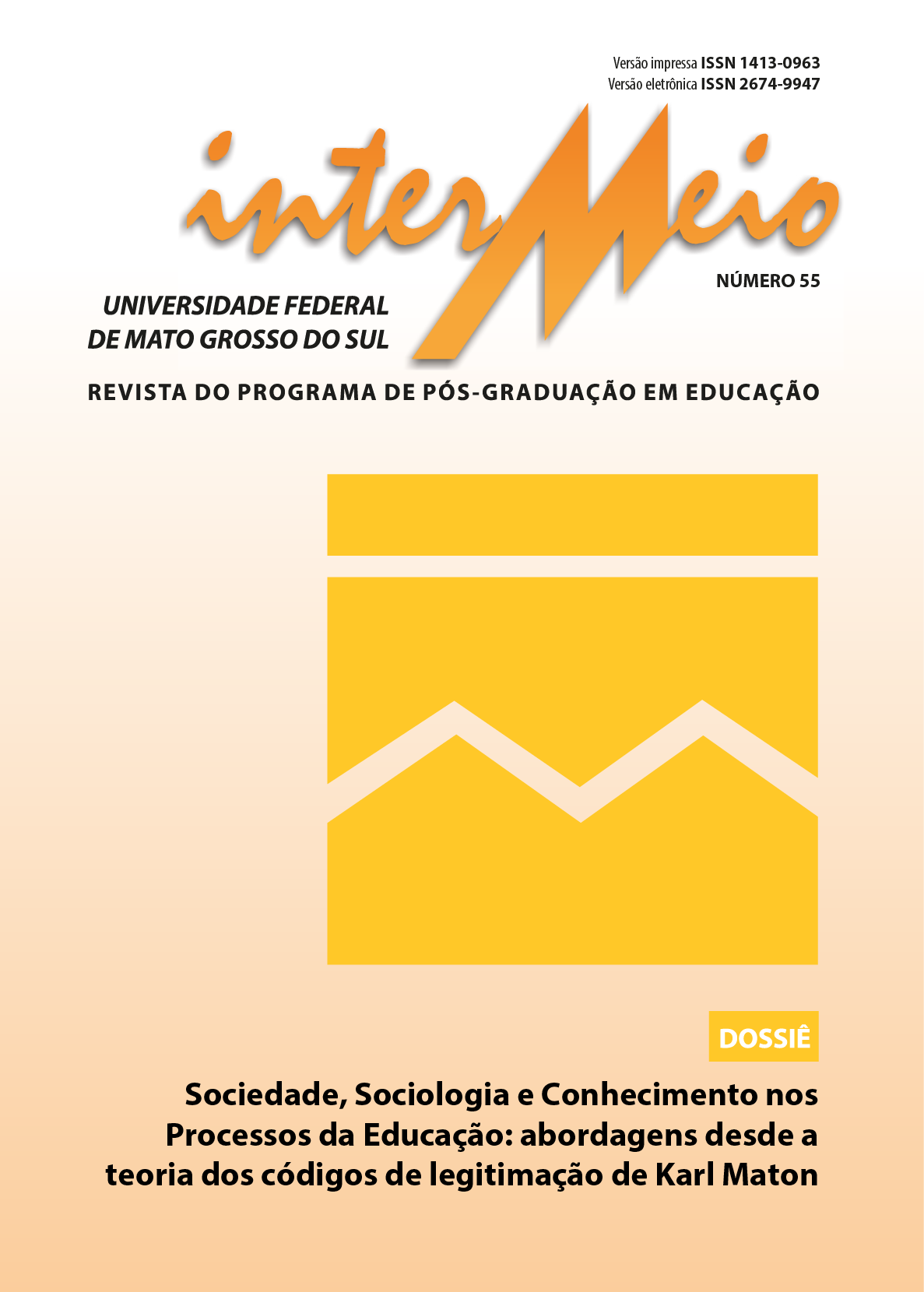DIMENSÃO AUTONOMIA DA TEORIA DOS CÓDIGOS DE LEGITIMAÇÃO: o que sabemos até agora?
DOI:
https://doi.org/10.55028/intermeio.v28i55.17227Palavras-chave:
Dimensão Autonomia, Conhecimento Integrativo, Códigos de Autonomia, Teoria dos Códigos de LegitimaçãoResumo
A integração de diferentes ramos do conhecimento nas práticas sociais como a educação tem desafiado profissionais em vários campos de atuação. Compreender os princípios que promovem a integração bem-sucedida é a chave para a análise e para o planejamento das práticas. Este artigo apresenta uma revisão bibliográfica sobre pesquisas que utilizam a dimensão Autonomia da Teoria dos Códigos de Legitimação. Nosso objetivo é conhecer como essa dimensão vem se desenvolvendo em pesquisas empíricas e discutir seus potenciais analíticos para estudos que investigam e planejam práticas de ensino integradoras. Nossa revisão salienta que as pesquisas que envolvem a dimensão Autonomia são recentes, mas vem se ampliando quanto aos objetos de pesquisa, aos níveis de ensino e a sua distribuição geográfica. As pesquisas já publicadas evidenciam que essa dimensão ainda está a desenvolver seus dispositivos de tradução, porém já demonstraram as possibilidades de diálogo com outras dimensões da TCL, como a Semântica e a Especialização, bem como
com a Linguística Sistêmico-Funcional.
Downloads
Referências
BURNHEIM, C. External engagement and institutional autonomy in higher education Australian Association for Research in Education Annual Conference, Fremantle, novembro, 2007.
GALE, T.; WRIGHT, J. Utility as a first principle for educational research: Reworking autonomy in Australian higher education. ACCESS: Critical Perspectives on Communication, Cultural & Policy Studies, v. 27, n. 1-2, p. 115-129, 2008. Recuperado de: https://ro.uow.edu.au/edupapers/709.
GARRAWAY, J; REDDY, L. Analyzing work-integrated learning assessment practices through the lens of autonomy principles, Alternation, v. 23, n. 1, p. 285 – 308, 2016. Recuperado de: https://journals.ukzn.ac.za/index.php/soa/article/view/1349.
JACKSON, G. Harry Potter and the Critical gaze: Autonomy pathways in literary response writing. Journal of Education, n 83, p. 69-86, 2021. DOI:10.17159/2520-9868/i83a04.
LOCKE, P; MATON, K. Serving two masters: how vocational educators experience marketisation reforms. Journal of vocational education & training, v. 71, n. 1, p. 1-20, 2019. DOI: 10.1080/13636820.2018.1480521.
MARTIN, J. Pedagogic discourse: Marshalling register variation. Revista signos: Estudios de linguística, v. 54, n. 107, p. 771-798, 2021. DOI: 10.4067/S0718-09342021000300771.
MATON, K. A question of autonomy: Bourdieu's field approach and higher education policy. Journal of Education Policy, v. 20, n. 6, p. 687-704, 2005. DOI: http://dx.doi.org/10.1080/02680930500238861.
MATON, K.; HOWARD, S. K. Taking autonomy tours: A key to integrative knowledge-building. LCT Center Occasional Paper, v. 1, p. 1–35, 2018.
MATON, K.; HOWARD, S. K. Autonomy tours: Building knowledge from diverse sources. Educational Linguistics Studies, v. 2, p. 50-79, 2020a. Recuperado de: https://www.researchgate.net/publication/345753214_Autonomy_tours_Building_knowledge_from_diverse_sources.
MATON, K.; HOWARD, S. K. Autonomy: the next phase of dialogue between systemic functional linguistics and Legitimation Code Theory. Journal of world languages, v. 6, n.1–2, p. 92–112, 2020b. DOI: 10.1080/21698252.2020.1720160.
MATON, K.; HOWARD, S. K. Successfully integrating mathematics into science teaching. In: MATON, K.; MARTIN, J. R.; DORAN, Y. J (Orgs.) Teaching Science: Knowledge, language, pedagogy, London: Routledge, 2021a, p. 23-48.
MATON, K.; HOWARD, S. K. Activating the affordances of multimedia in teaching. In: MATON, K.; MARTIN, J. R.; DORAN, Y. J (Orgs). Teaching Science: Knowledge, language, pedagogy, London: Routledge, 2021b, p. 76-102.
MEYER, W. H. A critical reflection on my integrated literacy pedagogy based on Reading to Learn, LCT (Semantics) and LCT (Autonomy) (and its effects on student writing). 2021. 161 f. Dissertation (Master of Education) – University of Cape Town, South Africa, 2021.
SILVA, E. C. M. Gêneros na teoria sistêmico-funcional. D.E.L.T.A., v. 34, n.1, p. 305-330, 2018. Recuperado de: https://revistas.pucsp.br/index.php/delta/article/view/38996.
SANTOS, B. F. Códigos de especialização na formação inicial de professores de Ciências Naturais. In: CHAPANI, D. T., DUARTE, A. C. S.; SANTOS, B. F. (Orgs.). A pesquisa e a formação de professores de ciências e matemática, Curitiba: Editora CRV, 2020, p. 13-33.
TANN, K.; SCOTT, A. Bridging disciplinary knowledge: the challenge of integrating EAP in business education. Higher Education, v. 81, n. 3, p. 453-470, 2021. DOI: 10.1007/S10734-020-00551-0.
ZHAO, W. Exploring college English teaching of rhetorical knowledge: A Legitimation Code Theory analysis. Language Teaching Research, p. 1-21, 2020. DOI: https://doi.org/10.1177/1362168820931636






